Documentary on Milosevic trial
If you are looking for a gentle introduction to the Milosevic trial, take a look at this dutch documentary.
Part 1
Part 2
Radovan Karadžić – Initial Appearence
Initial Appearence of Radovan Karadžić before the Hague ICTY tribunal 2008-07-31.
This is a 10 minute summary of the first trial day with english subtitles.
A reworked indictment is on it’s way and a second Initial Appearence based on the new indictment will take place 2008-08-29. PDF document of Karadžić’s claimed issues regarding irregularities are available here.
The General
 During the trial of Milosevic a lot of interesting witnesses were called. But if you want to read only one transcript, this one pretty much summarizes it all.
During the trial of Milosevic a lot of interesting witnesses were called. But if you want to read only one transcript, this one pretty much summarizes it all.
http://www.un.org/icty/transe54/041123IT.htm
Page 33681
Introducing the witness
Q. Could you please state your full name.
A. My name is Leonid Gregori Ivasov. [first vice-chairman of the Academy of Geopolitical Issues of Russia, military rank is colonel general]
Q. Did you receive detailed information on all events in Kosovo? When I say “detailed,” I’m referring both to confidential and secret information.
A. Yes. I received various types of information which was based on intelligence sources of intelligence services. It was also based on my continuous meetings with high military and political officials of various countries including NATO Member States. I received that information through the work of analytical centres within Russia and other countries, and in addition to that I received my information from the international conferences in which I took part or my subordinates did. I also received information directly from my contacts with President Milosevic, from Chief of Staff, and high officials, military officials of Federal Republic of Yugoslavia. I also received information from the Verification Mission in which my subordinate officers took part.
Q. Were you involved in any analysis? Did you take part in drafting any documents and the like?
A. Yes. That was my duty; namely, to analyse the situation unfolding in Yugoslavia, to make conclusions, and to report to the minister of defence and the president. In early 1998, in order to analyse the situation around Kosovo, a special analytical centre was established in my directorate, and it dealt specifically with those issues. And the documents generated were sent to the Main Staff and the president of Russia.
Page 33684
Introducing the subject
 Q. Now let us be more precise about the time period I want to refer to now. Could it be said that the Russian side very closely followed the events in Kosovo in 1997, 1998, and 1999?
Q. Now let us be more precise about the time period I want to refer to now. Could it be said that the Russian side very closely followed the events in Kosovo in 1997, 1998, and 1999?
A. Yes, that’s right, Mr. President. We intensified information activity in that region. We also intensified our staff within the Russian embassy in Belgrade and gathered information from various sources in order to have an objective picture of what was going on, in order to conclude what were the intentions of all sides involved, especially the terrorist organisation KLA, in order to define what were the channels of weapons entering Kosovo, in order to locate camps and training bases where terrorists were trained, and also in order to locate what were the sources that provided military, political, and financial source — support to the KLA.
Q. Before I put a question related to what you’ve just told us, please describe briefly the then-situation in Kosovo.
A. The — at the end of 1998, we had a full picture of what was going on in Kosovo. General Staff of Russia and my directorate analysed the situation, and based on the information obtained, based on consultations with various military experts from various countries, we concluded that as far as Federal Republic of Yugoslavia was concerned, there was a broad plan to destroy the country, to discredit military and political leadership of the Federal Republic of Yugoslavia aimed at seceding Kosovo from Serbia and Yugoslavia, separating it from those two countries. We also saw the interaction of various forces. First of all, we saw that in the process of establishing KLA and destabilisation of the situation, a Mafia was established, an international Mafia and a Caucasian Mafia, which wanted to establish its strongholds in Pristina and Albania in order to distribute drugs throughout Europe. Analysing the information, we also concluded that the National Security Council of the United States, back in 1997, adopted a decision to carry out a military operation against Yugoslavia. The plan of that operation was aimed at conducting a very powerful psychological war against Yugoslavia aimed at disrupting the negotiations and inform the international community about what was going on in Kosovo as well as to prepare the international public for the impeding military operation. This plan and these conclusions were reported by us to the leadership of our country, and we also warned the leadership of Yugoslavia.
JUDGE ROBINSON: I’m stopping you because the narrative has gone on too long. It’s time for more specific questions to be put. I wanted to ask you whether information that you received which led you to these conclusions, was that gathered exclusively from the Russian embassy in Belgrade?
THE WITNESS: [Interpretation] Thank you, Your Honour. I will be brief. This information originated not only from the Russian embassy. We received it through daily contacts with NATO representatives. We also received that information through our contacts with other states which were not NATO Member States, and also from open sources. After analysing this information, we reached this conclusion that there was a broad plan to carry out this operation against Yugoslavia, the operation that I’ve just described.
Page 33690
Confirmation of NATO plan to attack YU 1997
 Q. General Ivasov, you’ve mentioned 1997 and the conclusion of the National Security Council of the United States concerning the attack against Yugoslavia. Does that mean that you can confirm here that you had information at your disposal concerning the fact that way back in 1997 there was intention to attack Yugoslavia?
Q. General Ivasov, you’ve mentioned 1997 and the conclusion of the National Security Council of the United States concerning the attack against Yugoslavia. Does that mean that you can confirm here that you had information at your disposal concerning the fact that way back in 1997 there was intention to attack Yugoslavia?
A. Yes, Mr. President, I confirm this. Firstly, my affirmative answer is based on the analysis of the strategic of national defence of the United States, especially of 1993, in which a bet was placed on the military force in order to establish and not to protect the US interests in the world. I refer to the military charter of the United States army and those documents which were in force at the time when these decisions were passed. And I also base my conclusions on those materials and that data which I have at my disposal. Yes, indeed, at the end of 1997 a wide scale, coordinated plan was being implemented, targeted at the destruction of the Federal Republic of Yugoslavia. There is an analysis of political, economic, and military reasons for that, and that plan was being implemented in a stage-by-stage basis. In the light of the duration of that plan, I will refer only to the plan of the informational and psychological warfare. In the United States, there is such a rule FM33-5, which prescribes the operations of informational and psychological warfare, and everything which was being implemented in Yugoslavia is fully in line with the provisions of that rule.
JUDGE ROBINSON: Mr. Ivasov, may I ask you whether you have brought any documents that evidence this plan.
THE WITNESS: [Interpretation] I have brought with me documents of the General Staff, analytical documents of the General Staff of the Russian Federation which were, in 2000, declassified and which were made available to the public under the title “The Balkans Today and Tomorrow.” This was published by the edition of the General Staff of the Russian Federation. It includes all the specific data and conclusions, including the description of the scenario plan of those things which were being applied with regards to the — to the former Yugoslavia.
[interruption, the Trial Chamber confers]
JUDGE ROBINSON: Mr. Milosevic, we’ll allow you to carry on. Does the witness have this — the last document to which he referred, which I think is an American document, a document emanating from the United States.
THE WITNESS: [Interpretation] The documents are in the United States, but such documents as the strategy of the national security, the military doctrine of the US army, those documents get published in open press. As far as the field manuals are concerned and the instructions in psychological warfare, I can say that I had them at my disposal, but I believe that it would be feasible to request those documents directly from the United States, because I do not have them with me at the moment. I have some paragraphs or excerpts from those documents but not the full texts.
Q. In addition to this informational and psychological warfare, General Ivasov, is it true that in addition to that, in parallel, a military structure was being created? You knew that airports and military bases were being prepared in Hungary, Macedonia, and neighbouring countries in order to be used for operations against Yugoslavia. This is not informational and —
JUDGE ROBINSON: That is — that is clearly leading. “You knew that airports and military bases were …” That’s putting evidence in the witness’s mouth.
Page 33694
THE ACCUSED: [Interpretation] Very well. Then I will reformulate my question.
MR. MILOSEVIC: [Interpretation]
Q. What did you know about physical preparations being carried out for attack against Yugoslavia?
A. Yes, I was aware of this. The preparations were done in a complex way. I already mentioned the information on psychological preparations, but in parallel to that, certain military operations were being prepared. Starting from January 1998, there was an escalation of grouping of intelligence satellites of the United States, and military infrastructure was being prepared. In particular, ten airfields of NATO Member States expanded their operational capabilities. They were getting closer to the borders. Infrastructure was being brought closer to the Yugoslav borders. In particular, the military infrastructure was being set up in Macedonia, in Hungary, and partially in Albania. In parallel to that, additional preparations were taking place in the NATO troops. All this can be characterised as the preparation for a major military campaign. All these issues in particular Marshal Sergeyev and myself raised at the meetings of the Russian NATO Council in particular on the issues of the military pressure on the Federal Republic of Yugoslavia.
Q. When did you, General Ivasov, together with Mr. Sergeyev, raise the issue of military pressure on Yugoslavia at the session of the Military Council?
A. For the first time this issue was raised by Marshal Sergeyev in May 1998, but in December 1997, at the meeting of the ministers of defence of Russia and NATO countries, General Rodionov – in those days he was minister of defence – also raised this question. Moreover, we transmitted some information to members of the Russian NATO Council. Marshal Sergeyev offered a concrete plan of settlement of the situation in Kosovo within the framework of the Russia-NATO operation. And this plan included the building up of the peaceful initiatives and peaceful ways of conflict settlement. However, there was no unity in NATO. When minister of defence of Italy agreed with the proposal of Marshal Sergeyev at the meeting of the Russian NATO Council that indeed it would be — it will be possible to concentrate on the ways to seek the settlement of the Kosovo issue in a peaceful way and through the establishment of a collective security model in Europe, he was interrupted by the US representative, Mr. Cohen, and as a sign of protest he abandoned the meeting hall. So we always raised these issues. Moreover, in December 1998, General Kvashnin, general of the army and Chief of the General Staff of Russia, at the meeting of the military staff committee of the Russian Federation, transferred to General Clark our intelligence data regarding the composition of the Kosovo Liberation Army and the training camps for terrorists and the routes of passage and transit and trafficking of weapons through Macedonia and Albania, and suggested to concentrate the joint effort on the cessation of the terrorist training activities and the supply of weapons to Kosovo. He also offered a plan of joint activities between Russia and NATO with the participation of the armed forces and the security forces of the Federal Republic of Yugoslavia. Mr. Clark took this with acknowledgement and gratitude, but sometime later he informed us that the NATO intelligence is extremely weak and is unable to confirm that data.
Q. So, General Ivasov, you not only knew in 1997 and 1998 about the preparations of attack on Yugoslavia, but you also had talks about it with NATO representatives at the sessions of the joint Russia-NATO Council; is that correct?
A. Yes, Mr. President, this is so. And in NATO, we saw different opinions and different approaches to this issue. In particular, the majority of ministers of defence of NATO Member States did not manifest any initiative or even objected against the preparation of a military operation. The most active part was played by the minister of defence of that United States and the minister of defence of the United Kingdom. The rest were just taking a passive role, objection. And only by February 1999, General Zavarzin, the representative of Russia to NATO, reported to me that all the ministers of defence of NATO Member States have been broken and support the military aggression.
KLA/UCK classified as terrorist organisation by Russia
 Q. Thank you, General Ivasov. How would you qualify KLA?
Q. Thank you, General Ivasov. How would you qualify KLA?
A. In all Russian official documents which were being developed by the Ministry of Defence and which were reported to the leadership, the Kosovo Liberation Army was referred to as an illegal military formation carrying out terrorist activities; and the president of the Russian Federation, the parliament and all the official ministries, were in agreement with that definition. The same definition was accepted, at least it was not objected against, also in the Russian-NATO Council and also at the bilateral level between the ministers of defence and other military and political leaders of NATO Member States. And I’m not even mentioning the non-aligned or neutral countries such as Finland or Sweden. Hence the definition of the illegal military formation is the official — is an official and legal term or definition in Russia which we use. And moreover, we believed that the leadership of the Federal Republic of Yugoslavia had not only the right to combat illegal military armed formations —
Page 33700
And other countries too
Q. Very well, General Ivasov. You qualified the KLA as a terrorist organisation. Do you know that in the West, too, it was long considered to be a terrorist organisation as well?
A. This can be confirmed by the bilateral meetings in our contacts, but this can be also confirmed by the conclusions of international organisations, and I can quote here the examples both of the Contact Group, which in the beginning of 1998 defined the activities of KLA as terrorist activities. And the same definition, in fact, was also present in our discussions with NATO. They did not refer to KLA as a terrorist organisation in their official documents, but terrorist activities were recorded as such. Hence, this was an international understanding or recognition of the fact that KLA is an illegal terrorist organisation.
Foreign participation
Q. Tell me, General Ivasov, what do you know about foreign participation in the support and financing of the KLA and the activities of outside sources, and the activities of the KLA?
 A. Yes. I’m aware that support to KLA was being provided from different structures, primarily from the Caucasian-Albanian-Turkish drugs Mafia. This was a broad network, and in accordance with our data at the initial stages of the establishment of KLA, from the funds of drug trafficking, there was up to 45 per cent of the financing for the procurement of armaments and supplies. I also know that such an international organisation as the People’s Movement for the Republic of Kosovo, established as early as 1982, had a broad network in such countries as Germany, Switzerland and other European countries and in the United States. This organisation was engaged in the collection of funds for the procurement of armaments and the training of terrorists. We were also aware that before the commencement of the military action or by the end of 1998 the KLA had in its possession the modern type of equipment and armaments that could be supplied only by the Western countries. And the main armaments were procured in 1994-1996 in Northern Albania when the Albanian people and Albanian rebels basically managed to defeat them, and there were some weapons taken in battles and there were cases of sales of weapons in Macedonia. So I can confirm the participation in the — such support being accorded to the financing and procurement of arms for KLA.
A. Yes. I’m aware that support to KLA was being provided from different structures, primarily from the Caucasian-Albanian-Turkish drugs Mafia. This was a broad network, and in accordance with our data at the initial stages of the establishment of KLA, from the funds of drug trafficking, there was up to 45 per cent of the financing for the procurement of armaments and supplies. I also know that such an international organisation as the People’s Movement for the Republic of Kosovo, established as early as 1982, had a broad network in such countries as Germany, Switzerland and other European countries and in the United States. This organisation was engaged in the collection of funds for the procurement of armaments and the training of terrorists. We were also aware that before the commencement of the military action or by the end of 1998 the KLA had in its possession the modern type of equipment and armaments that could be supplied only by the Western countries. And the main armaments were procured in 1994-1996 in Northern Albania when the Albanian people and Albanian rebels basically managed to defeat them, and there were some weapons taken in battles and there were cases of sales of weapons in Macedonia. So I can confirm the participation in the — such support being accorded to the financing and procurement of arms for KLA.
JUDGE BONOMY: Mr. Ivasov, in connection with the idea of a psychological campaign against Yugoslavia, you mentioned a document which was FM33-5. What is that document and where is it?
THE WITNESS: [Interpretation] This is a document of the US army. It is called “Manual on the Information and Psychological Warfare.” I can quote some passages from that document if Your Honour leaves me to do so.
JUDGE BONOMY: No. That’s a matter for Mr. Milosevic or Mr. Nice to take up. I just wanted to be clear about the identity of the document. Thank you.
JUDGE ROBINSON: Is that — is that a general manual to which you’re referring? It’s not specifically related, is it, to Yugoslavia?
THE WITNESS: [Interpretation] Yes, Your Honour. This is a general instruction manual or operational manual which is to be used for guidance by political and military people. And when we were considering the situation and I had this manual available to me, it was quite obvious that all the technological activities were being implemented in accordance with the guidelines outlined in that manual.
Objectives of UCK/KLA
Q. General Ivasov, are you aware of the political objectives that this terrorist organisation, KLA, held?
A. Yes, Mr. President, I am. First of all, the leaders of the KLA never concealed their separatist ambitions, and always pursued secession from the Federal Republic of Yugoslavia. In this ambition, they received international or, rather, foreign support. That was their objective and the tactics of their struggle. Their second objective, and in this they were influenced by foreign powers, was to destabilise the situation in the province, to carry out terrorist activities in the territory of that province. Therefore, I can confirm that their political objectives were separatist and terrorist, and the methods for attaining those goals were illegal activities against the law enforcement agencies.
UCK/KLA – NATO
 Q. What do you know about the link between the KLA and NATO?
Q. What do you know about the link between the KLA and NATO?
A. I know about such links. They existed on the official level when representatives of NATO officially received representatives of this separatist movement and had contacts with KLA leaders. There were also informal secret meetings that took place with the mediation of NATO special services. With the development of the Verification Mission, Mr. Walker, too, immediately met with —
JUDGE ROBINSON: Could you tell us a little more about the meetings that you said took place between the representatives of NATO and the KLA leaders. When was this and where?
THE WITNESS: [Interpretation] Most of these meetings took place after the establishment of the Verification Mission. Our representatives to the Verification Mission reported about the contacts of Mr. Walker, starting with October until January, as well as the meetings of representatives of NATO member countries to the Verification Mission. And we received information that in that period intelligence operations were carried out in the territory of the province involving jointly the representatives of NATO and representatives of the KLA. They passed on information about the location of police posts, army deployment, and military facilities in the province, and our people also reported to us about the establishment of special radio transmission devices by NATO.
JUDGE ROBINSON: What date? Do you know the date?
THE WITNESS: [Interpretation] This happened from the summer of 1998 up until the beginning of the aggression against the Federal Republic of Yugoslavia. The most frequent meetings took place in the period from January to March. We also know that Mrs. Albright passed on to Hashim Thaci this piece of information; namely, if the KLA agrees to the deployment in Kosovo of NATO troops, then she would guarantee to them the implementation of a referendum. I met with Mr. Walker and also raised this issue. I asked him why he was meeting so often with KLA representatives, naming names, while not meeting with the representatives of Serbian authorities and Serbian law enforcement authorities.
JUDGE ROBINSON: So the meetings between NATO officials and the KLA were taking place before the airstrikes?
THE WITNESS: [Interpretation] Yes. Yes, I can confirm that, Your Honour.
JUDGE ROBINSON: Mr. Milosevic.
MR. MILOSEVIC: [Interpretation]
NATO prepares for aggression
Q. Simultaneously, as just mentioned, NATO troops built up on our borders.
A. Yes, that is so. I have already said that the military infrastructure was being developed for a major military operation. Intelligence activities were being stepped up against the Federal Republic of Yugoslavia. Specifically, a regiment of special purposes of the United Kingdom was transferred before the aggression to the territory of Macedonia and established 80 intelligence units for radio surveillance and implemented activities to gather intelligence and organise provocations. The representatives of this regiment frequently met with KLA representatives and jointly tried to infiltrate the territory of Kosovo.
 Q. Is the build-up of these military activities the reason why we increased the presence of our forces in that area?
Q. Is the build-up of these military activities the reason why we increased the presence of our forces in that area?
A. In NATO plans, as the General-Secretary of NATO, Mr. Solana, said more than once, it was included to implement a ground operation with broad use of aviation and ground forces. To carry out a ground operation on the territory of Macedonia and Albania, a powerful group of NATO forces was organised, including the deployment of operative and tactical missiles, a deployment of launches, and fighter helicopters as well as other powerful military equipment. That also included the deployment of two groups of special forces. So when the representatives of NATO officially announced the readiness for an airstrike and ground operation, the armed forces of Yugoslavia were simply obligated, as the armed forces of any country would, to prepare for defence against the aggression. And I believe that the deployment of their forces and increase of their presence in the province was, in my opinion, completely in conformity with the constitution and with their own obligations.
Q. I just wish to emphasise one thing: Airstrikes, you said, plus a ground operation. That means both.
A. Yes, that means both. And indeed, NATO was preparing for both, including the ground operation. However, the ground operation didn’t happen for three reasons.
- First, there was no consensus within the NATO to carry out this ground operation. There was a number of countries which refused to participate.
- Second, by that time, major losses were inflicted on the KLA by the Serb police and armed forces.
- And third, this ground operation didn’t happen because, as a result of the airstrikes, the ground forces of Yugoslavia preserved their combat readiness.
Q. General Ivasov, is it clear, then, that our forces were mounting a defence of the country? They were busy defending the country?
A. Yes, yes. I confirm that. Moreover, the Russian military, including the Defence Minister of Russia, Marshal Sergeyev, myself, and the General Staff proposed the adoption of even more extreme measures for the defence of Yugoslavia’s territory and the defence of the territorial integrity and inviolability of its borders. That is a prerogative of every country.
Serbia prepares to defend itself
Q. I’m asking you this because claims are being made here that we were building up forces in order to expel our own citizens of ethnic Albanian ethnicity from the province. So was the reason for this build-up our own defence or, as they allege, the expulsion of Albanians?
A. I assert and affirm that the Serb police and the Serb security forces were forced to eliminate KLA terrorist activities in their own territory. And this is something that Russia pressed the Yugoslav leadership to do, because the terrorist activities of the KLA first destabilised the situation in Yugoslavia. Second, it spread to the territory of the neighbouring countries. And third, it caused massive flows of refugees. Furthermore, any terrorist act, any skirmish or shooting involving both parties caused panic among the citizenry who fled for cover. And I can confirm that it was precisely KLA leaders who conducted psychological operations and exerted pressure on the civilian population to either join the KLA or to leave the area. I met in Greece with Albanian Catholics, with a family of Albanian Catholics who told me that one of KLA field commanders, Adem Jashari, forced Albanian Catholics to join the KLA, and anyone who refused was simply physically liquidated. Therefore, failure to act by the Serbian authorities was not the reason for this flow of refugees. It was the terrorist activity of the KLA.
JUDGE KWON: General Ivasov, in an answer to the previous question, you said that you and defence minister and the General Staff proposed the adoption of even more extreme measures for the defence of Yugoslavia. Could you give some examples of such more extreme measures.
THE WITNESS: [Interpretation] Way back in December 1997, the defence minister of Russia, General Rodionov, suggested both to President Milosevic and the Chief of General Staff to increase the presence of security forces and police forces in the province in order to isolate terrorist groups, detect their leaders and organisers, and to stop the supply of weapons and recruits across the border. We were aware that it was necessary in order to avoid engaging the army of Yugoslavia in these operations. However, according to our information and the information available to the General Staff of Yugoslavia, it was insufficient to use only the security forces. Because the situation in the country caused deep concern, it was necessary to protect the borders and simultaneously conduct constant operations against terrorist activity. Furthermore, Marshal Sergeyev also pressed for a greater engagement of police forces and even the army. I saw many military reports and overviews where the main order for the army was to prevent the escalation of combat operations. Always those orders included – and we criticised them for it – but they always included the clause that in case of attack by terrorists, they should be called upon first to stop combat and warn them that in case of failure to do so, the army would use force. We, on the other hand, thought that in case of attack, one should immediately open fire on the terrorists.
JUDGE KWON: Thank you.
MR. MILOSEVIC: [Interpretation]
Page 33711
KLA/UCK – Al-Qaeda
Q. Do you know about the links between the KLA and the al Qaeda?
A. Yes. We knew that from our intelligence reports but also from the information we got from representatives of Islamic countries. I had regular contacts with the ambassadors of Islamic countries in Moscow, including the ambassador of Iran and other officials from Iran. They confirmed the links between Taliban and al Qaeda on the one hand with the representatives of the KLA on the other hand. They even indicated specific routes along which terrorists and weapons were infiltrated into the territory of the Balkans. However, they denied any official involvement of Iran or other Islamic countries in such actions except for Turkey.
Q. As far as I know, Ambassador Seferi of Iran denied the involvement of Iran but confirmed the links of Taliban and al Qaeda in his discussions with you.
A. That’s correct, Mr. President.
Recruiting Mercenaries
 Q. Do you have any knowledge about the activities of an organisation called MPRI, an American organisation including war veterans, military professionals?
Q. Do you have any knowledge about the activities of an organisation called MPRI, an American organisation including war veterans, military professionals?
A. Yes, I know about the activities of that organisation, and I know that it recruits mercenaries into different countries of the world. We also located earlier recruited instructors from the USA and other countries. We observed them in the northern areas of Albania, including the populated areas of Tropoja and Kukes. So I can confirm that fact, yes.
Q. When you say that you had talks with the ambassadors of Islamic countries, how many ambassadors would that be; two, three, five, ten?
A. At least 15 ambassadors from Arabic and other Islamic countries. They all agreed in the opinion that a terrorist war was going on in Kosovo. Some of them did not actively take part in the discussions, just tacitly agreed. However, the general opinion was that it was a terrorist operation in Kosovo, that a major military operation of NATO was being prepared against Yugoslavia, and the majority of the representatives of the Islamic countries I spoke to confirmed this.
Q. Does that mean that the representatives of Islamic countries, the ambassadors you spoke to in Moscow, also knew about the preparation of the NATO aggression against Yugoslavia?
A. Yes. I hope they were aware of it, but we received this confirmation also when we met with the highest officials of various countries, including the president of Syria, Hafez Assad, receiving Russia’s Defence Minister Marshal Sergeyev, and discussing this issue named the example of how they dealt with the separatists who carried out an insurgency in the town of Homs with the use of heavy artillery and army troops that prevented the spread of terrorism and separatism in the territory of Syria.
The NATO Plan
 Q. Tell me, what was the NATO plan? What did the top echelon of Russia’s military know about the NATO plan?
Q. Tell me, what was the NATO plan? What did the top echelon of Russia’s military know about the NATO plan?
A. I would say that the complete plan of the aggression against the Federal Republic of Yugoslavia was known by the highest officials of the USA. A lot of information was available to the defence ministry and the political leadership of the United Kingdom and other defence ministers of NATO member countries who had less information, so they gladly received the information that we gave them. The essence of this was the following: The plan was to discredit the political and military leadership of Yugoslavia with the aim of conducting psychological and media warfare. For that purpose, the 193 Aviation Squadron of the national army of the US – those were propaganda aircraft – were deployed in Macedonia. So a media war was started. Second, in the Military Committee of NATO, preparations were made, starting with 1998, of a military operation. Every defence minister knew on a need-to-know basis only a certain portion involving their own participation. This plan involved a relationship of alliance with the KLA and the opposition in Kosovo, the build-up of intelligence gathering activities, and the preparation of specific military actions. The plan envisaged that in case Mr. Milosevic and the Yugoslav leadership failed to accept the ultimatum involving the introduction of NATO troops, then this objective would be attained by military means, which is exactly what we saw. Mr. Walker, too, and Mrs. Madeleine Albright and other representatives of the US and NATO tried, through military pressure and expansion of terrorist activities in the province of Kosovo, tried to coerce the leadership into accepting this ultimatum which would violate the integrity, the sovereignty, and the territorial integrity of the republic and an occupation of Yugoslavia by NATO forces. The Yugoslav leadership did not agree to this, and that is why the plan of military strikes was carried out.
Q. Tell me, General Ivasov, in very specific terms, what happened in summer 1998 between NATO and Yugoslavia? What do you know about major military manoeuvres organised at that time on our borders?
A. I know about that, Mr. President, indeed. Way back, early in May 1998, in the Russian NATO Council, the topic of Kosovo was discussed. Russia eyewitnessed the preparation of a major wide-scale military operation, and Russia’s military marshal stated this at the Russia-NATO Council meeting and insisted that NATO should implement the provisions of the founding act governing the relations between NATO and Russia which was signed in 1997. They wanted assurances from Mr. Solana, from Mr. Clark, and General Shelton that Russia would participate in the analysis of the situation and that NATO should not take any decisions involving military pressure and even less military operations. However, during the visit of Marshal Sergeyev to Greece in September 1998, we saw wide-scale military drills of NATO air and ground forces, and that was an unpleasant surprise for our marshal. Our government recalled Marshal Sergeyev to Moscow because it was expected that these drills and exercises would grow into an aggression and our marshal indeed went back to Moscow, although the Greek representatives assured him that there would be no aggression. Nevertheless, such conduct by NATO violated not only the UN charter concerning threat of aggression but also ran counter to the founding act governing the relationship between NATO and Russia.
Q. Just to clarify, General Ivasov. Pursuant to this founding act and also in accordance with the specific conversation which took place between representatives of Russia and NATO representatives, NATO was duty-bound to consult Russia and to inform it on any military activity so that there would be no surprises such as those that Marshal Sergeyev and others eyewitnessed in Greece?
A. Yes, that’s right. That was observed in NATO. Regarding these military exercises, Marshal Sergeyev sent a protest letter to ministers of defence of all NATO countries. He proposed to establish a joint working group in order to come up with proposals on peaceful resolution to the crisis in Kosovo. Some ministers replied to that, and some ministers didn’t. In addition to that, if Your Honour would like me to, I can give you the names of the ministers of defence of NATO countries who complained to Marshal Sergeyev because military pressure was exerted upon them regarding a military operation.
Q. At the time, did you speak to NATO officials? What I have in mind is Mr. Solana, Cohen, Clark, and the others.
A. Yes. Every time a minister of defence visited NATO, or I myself, also involved meetings with general-secretary, also General Clark, and other officials in Europe. All of these visits and meetings took place regularly, both in Brussels and in Moscow.
Q. Is it true that minister of foreign affairs also put similar questions within the group of eight where Russian side pointed out to the Helsinki principles, UN Charter, and other international treaties?
A. Yes, that’s right. This was done both within the NATO and Russia contacts, and ministers of — ministers of foreign affairs discussed the crisis in Kosovo within the Contact Group and other groups. The position of Russia was always the same. Russian representatives always proposed a very complex plan for peaceful resolution of the crisis in Kosovo. Russian representatives, especially Russian foreign ministers, pointed out that not all peaceful and political measures were used in order to resolve the situation, and they were strongly opposed to the military operation. Some people agreed with this position, and some people objected to it, trying to blame Belgrade for everything, Belgrade and the leadership of Yugoslavia. So the opinions varied. However, this was a very firm, uniform position that Russia always advocated, and it was approved by President Yeltsin.
NATO Cover-Up
Q. General Ivasov, please tell me, since you had at your disposal various information that you’ve mentioned here on specific points where conflicts broke out, where there was a build-up of the KLA, what routes were used to bring in weapons, what assistance was received from the outside, your then-Chief of Staff, General Kvashnin, in December of 1998, did he convey all of this vast information to General Clark?
 A. Yes. Russian General Staff had such information, information on several camps. I think there were a total of 11 camps where terrorists had training in Northern Albania and in Kosovo. He also reported on warehouses where ammunition and weapons were kept. He also quoted five routes used for supply of weapons, narcotics, and also routes used for troops in order to move in from Albania and Macedonia. All of these routes led to Kosovo. This information was conveyed to General Clark. This was specific military information conveyed to him. We decided to convey this information to NATO so that through joint effort we could put an end to terrorist activity of the KLA and disrupt the support routes for the KLA. This was unprecedented measure taken by the Russian General Staff. Unfortunately, General Clark referred to weak information of NATO intelligence which was not true and refused to discuss this issue. Intelligence services of NATO were quite powerful. Intelligence satellites of USA were increased from ten to 30. And in addition to that, they also established various new information — intelligence groups. So therefore, the fact that — the claim that NATO intelligence was weak was not true.
A. Yes. Russian General Staff had such information, information on several camps. I think there were a total of 11 camps where terrorists had training in Northern Albania and in Kosovo. He also reported on warehouses where ammunition and weapons were kept. He also quoted five routes used for supply of weapons, narcotics, and also routes used for troops in order to move in from Albania and Macedonia. All of these routes led to Kosovo. This information was conveyed to General Clark. This was specific military information conveyed to him. We decided to convey this information to NATO so that through joint effort we could put an end to terrorist activity of the KLA and disrupt the support routes for the KLA. This was unprecedented measure taken by the Russian General Staff. Unfortunately, General Clark referred to weak information of NATO intelligence which was not true and refused to discuss this issue. Intelligence services of NATO were quite powerful. Intelligence satellites of USA were increased from ten to 30. And in addition to that, they also established various new information — intelligence groups. So therefore, the fact that — the claim that NATO intelligence was weak was not true.
Q. As far as I know, it took one month from the minute this information was conveyed to General Clark for him to answer that, despite all resources at their disposal, they could not confirm that information.
A. Yes, that’s right. However, General Zavarzin, Russian representatives in NATO, tried to cooperate with the representatives of the Military Committee of NATO based on this information to have some bilateral context. And it turned out that Klaus Naumann and other generals within that committee knew nothing about this information, whereas General Clark confirmed what I previously told you.
Q. Therefore, not — even those who were within the inner circle knew nothing about that information.
A. Yes. We did not receive any information telling us that Russian information was analysed and discussed.
Q. Through your representatives within the Verification Mission, were you able to find out whether the information given to General Clark was passed on to Verification Missions so that it could verify what was going on in Kosovo?
A. No. We did not receive any such confirmation. Our officers who worked within the mission had this information, and they tried to convey this information to representatives of other countries within the mission. However, they received no support from them. Moreover, representatives of NATO countries in Verification Mission first of all reported to the Verification Mission staff the data that was not objective. In addition to that, they conducted intelligence activities aimed at establishing coordinates of police forces, military facilities, and so on. And we knew that they had the equipment needed to establish such information. There were many honest people in the mission, both from NATO countries and neutral countries, but there were also others who conducted intelligence activities that would assist the future NATO air raids.
Q. General Ivasov, these exercises in Greece, if I understand your explanation well, were seen by Russian top military leadership as a clear intention of NATO to enter Yugoslavia, and that was obvious back in the middle of 1998, wasn’t it?
A. Yes, that’s right. Reports of the Ministry of Defence of Russia and Ministry of Foreign Affairs were conveyed to President Yeltsin, and he agreed with such reports. That was the information at the disposal of Russian authorities, and based on that they defined their positions. The negotiations taking place and the deployment of Verification Mission was just a smokescreen needed to conceal the preparations for the aggression. In addition to that, I would like to point out that Yugoslav leadership, when conducting negotiations with Holbrooke, with Clark, with Solana and others, made serious concessions detracting from their sovereignty. Instead of increasing political activities, NATO and the international community did nothing about the intensification of KLA terrorist activities which became even more intensive when OSCE mission was deployed to the area. Therefore, we concluded that Verification Mission agreements signed in October by Holbrooke and Milosevic, as well as other agreements, were made just in order to conceal the preparation of aggression. In negotiations, Mr. Solana and Mr. Clark more and more frequently indicated that military operation was unavoidable. Mr. Walker, in late 1998, publicly stated that Serbs have no business in Kosovo.
Q. The threats were increasing, troops were building up, Yugoslavia was under UN sanctions when it came to weapons procurement. Was that what the situation was?
A. Yes. That’s exactly what the situation was. General Ojdanic, Pavle Bulatovic, minister of defence of Yugoslavia, they criticised us Russian officials for the fact that the KLA was increasing its forces whereas Yugoslav army could not even receive spare parts for its equipment. We discussed these issues within NATO, and we pointed out that there was no equality of arms there. On one hand, we had illegal terrorist organisation which was becoming stronger by the day, training its forces, whereas on the other hand, Yugoslav People’s Army was not allowed to do the same. We considered this to be one element of the aggression preparation aimed at weakening Yugoslav armed forces.
Q. Did the leadership of Yugoslavia apply to Russia for military assistance?
A. There were no such applications made at the official level. Federal Republic of Yugoslavia complied with the sanctions which, in my view, were not grounded. And these were sanctions imposed by the Security Council of the United Nations. The officers of the Yugoslav People’s Army blamed us for facilitating the aggression and the KLA, which was NATO’s ally.
Q. When the aggression commenced, what was the position of the Russian Ministry of Defence and the Russian military leadership?
A. First of all, I will tell you that the president of Russia, Boris Yeltsin, on the 25th of March, called NATO strikes an act of aggression. And this was the position to be taken by all other ministries. Ninety percent of Russian population also saw this as an act of aggression. Whereas the head of Russian Orthodox church, Patriarch Alexei II, on the 25th of March, 1999, called this a sin before God and a crime which was a violation of international law. We carefully studied the legal provisions of the UN Charter and the provisions of the General Assembly from 1974. I even carefully analysed the documents of Nuremberg trials. All of those documents indicated that an aggression was being carried out against an independent state. That was the only position taken by Russia.
Build-up Continues
Q. At the time, did the build-up of NATO forces in Macedonia continue?
A. Yes. The build-up of forces in Macedonia and Albania continued from the beginning of the aggression, and they were creating an attack group to commence an attack against Yugoslavia. We were able to observe that. In the second phase of airstrikes starting in May, the build-up slowed down. We received information from the ministers of defence of NATO countries indicating that there would be no ground operation as there was no consensus among NATO states. Armed forces of Yugoslavia, except for air forces, did not suffer major losses. Therefore, plans were made not to go ahead with ground campaign, but up until that time, the build-up was increasing, yes.
Q. Could you tell us briefly, what did you discuss with Walker when he came to see you, based on my information, on the 12th of February, 1999?
A. On the 12th of February, I did see Mr. Walker, and the first question I put to him was why Russian representatives within the mission were not allowed to present objective information. Why is it that in the mission reports only opinions of NATO representatives were including — included, disregarding Russian, Ukrainian, Swedish, and Finnish opinions? Mr. Walker replied that it was difficult to work because the only unarmed people in Kosovo were the mission members, and the rest of those present there were armed. And when I asked him who was it that armed the KLA, Mr. Walker said that there were various, numerous sources, and he wouldn’t detail them. The second question we discussed was what were the perspectives of political solution to the problem in Kosovo. Mr. Walker replied that by springtime of 1999, the situation in Kosovo would collapse and that military operation was unavoidable. And this is when he told me what I have described earlier, that Serbs have no business being in Kosovo.
Mr.Walker: “Serbs should leave Kosovo”
 Q. So that was his position, that Serbs should leave Kosovo. You understood him quite well, didn’t you?
Q. So that was his position, that Serbs should leave Kosovo. You understood him quite well, didn’t you?
A. Yes. That was the position stated publicly somewhat earlier by him, and then after that he confirmed it to me. The third issue I discussed with him had to do with intelligence activities of the representatives of several countries within the mission which was undertaken in the territory of Kosovo. He refused to confirm that, claiming that he was not aware of the situation.
Q. You have just mentioned that you asked him how the Albanian terrorists in Kosovo armed themselves and that he didn’t know what to reply, he didn’t know how that was done.
A. Yes, that’s right. He mentioned weapons from the Second World War which allegedly had been left there. He also mentioned some other sources that he knew nothing about, but he firmly denied that NATO countries and the United States supplied the weapons, and those were the countries that he represented.
Q. Did you have information indicating that they did supply weapons to them?
A. Yes. Yes. This was indirect information. In the territory of Kosovo in Northern Albania, sniper rifles were discovered, mortars, also night vision equipment, and also portable missile launchers manufactured by NATO countries. I don’t have direct information, I only have indirect information that at least from the territory of Turkey these weapons were supplied either through official or unofficial channels. Certain weapons could have come from Croatia, Slovenia, Bosnia and Herzegovina, as these countries started using new NATO weaponry.
Q. The same question on arming terrorists in Kosovo were put by Marshal Sergeyev on the 18th of February to Minister Scharping, the minister of defence of Germany. What was his reply?
A. Yes. I can confirm that this question was put to Minister Scharping. Minister Scharping also avoided answering it. He confirmed the fact that the weaponry was reaching terrorists in the area in large numbers, but he did not confirm that the source of those weapons was in NATO countries. He advised that channels originating from Middle East and Caucasus Mountains should be carefully monitored.
Q. In view of the fact that Russia was a member of the Verification Mission, that Russian representatives worked within that mission, could you please tell us what you think is most important and has to do with the work of that mission and the position of Russian representatives within that mission.
A. Russia agreed to establish that mission, bearing in mind that the activities of that mission should facilitate the peaceful resolution. When over 1.000 members of that mission were deployed to the region, it turned out that they were unarmed, that they had no protection, that their freedom of movement was limited, and that it was very difficult to gather objective information. However, despite that, Russia undertook all measures aimed at ensuring that its representatives would be able to collect objective information, and this is what they did. But let me point out once again that the representatives sent their reports both to the headquarters of the mission and to Moscow. To our surprise, we learned that in interim reports and the final report, the objective mission of Russian, Finnish, Swedish, and Ukrainian representatives was disregarded. Therefore, we sent these documents to the OSCE directly and to various legal organisations, and in December of 1998, I discussed this with our representatives in the mission, Mr. Ivanovski. I asked him why our opinion was disregarded. On the 12th of February, the same question was put to Mr. Walker, and on the 18th of February, minister of defence of Russia put that question to Minister Scharping as well. Therefore, we pressured, trying to ensure that the information in Kosovo was presented unbiased. We asked Mr. Walker how come he met mostly with the representatives of the KLA, representatives of Albanian population. We asked him why only refugees in Albania and in Macedonia were interviewed, and the opinion of various other organisations were disregarded, and how come Mr. Walker rarely met with the representatives of Serbs and other ethnicities in Kosovo. He blamed it on the fact that he had very little time.
Q. From what you’re saying, General Ivasov, can I conclude that it is based — that based on the results of research and investigation by your services, Walker’s reports were not objective?
A. Yes, I can confirm this. Moreover, when we suggested to him to strengthen the mission and to ensure security and to activate the activities, Mr. Walker would not agree to that.
[debate about if it is to be allowed to question KVM omitted]
MR. MILOSEVIC: [Interpretation]
Q. The reports of the Russian members of the Verification Mission, were they taken into account and treated equally as others by William Walker and his associates?
A. The main issue with which we could not agree, to which the Russian officials and other members of the verification mission could not agree was who was the initiator of the terrorist activities, the aggressive terrorist activities? We believe that the initiators were the KLA, some political opposition forces in Kosovo, and some external forces. The representatives of NATO states tried to prove the opposite; that they wanted to prove the KLA and to say that they were illegal formations they — which were trying to oppose the infringements from the side of the Serbian police forces. We were showing to them the fact that the Serb law enforcement bodies and the army were undertaking only activities to rebuff those actions and were only acting in retaliation. And they were trying to prevent the spread of instability and terrorist activities. Unfortunately, Mr. Walker, in his report, blamed everything on the Yugoslav authorities and the Serbian population. This is the main contradiction. I can quote here —
[Trial Chamber confers]
JUDGE ROBINSON: Mr. Milosevic, your next question.
MR. MILOSEVIC: [Interpretation]
Q. So the findings of your members of the Verification Mission, Mr. Ivasov, if I understood correctly, was that the forces of our country only reacted to terrorism.
A. Yes, I confirm that.
Q. Let us move on then.
JUDGE BONOMY: Before doing so, are you saying there are documents that demonstrate this?
THE WITNESS: [Interpretation] Yes, there are documents, and primarily this will be the orders of the General Staff of the Yugoslav People’s Army, the orders to the Pristina Corps, and other official documents where the armed forces and the police forces were tasked to prevent the escalation of the conflict, to isolate terrorists, and to protect the peaceful or civilian population. We have such orders.
JUDGE BONOMY: I understand that, but what I was thinking of, were reports prepared by your representatives within the KVM which were then not transmitted to the OSCE headquarters?
THE WITNESS: [Interpretation] Such reports were oral, transmitted by telephone or in writing in the form of documents, and some of those documents and some of that information was also transmitted to the OSCE directly. And in the report which I already mentioned, we also reflected our position. Moreover, the international human rights organisation Human Rights Watch also may draw a conclusion that the conclusions of the OSCE commission were biased, and we agreed to that. Our representatives also participated in the work of that commission.
[passage between questions omitted]
Verification mission leaves after war preparations were finished
Q. Please tell me very briefly, General Ivasov, why did the Verification Mission leave Kosovo?
A. I believe that as far as the imitation of the peace-making process, and I would like to outline the imitation of the peace-making process, I believe that that mission managed to fulfil its tasks in that area, and it also provided a reason for the implementation of the plan for the military operation against Yugoslavia. That is why it was evacuated in advance prior to the commencement of the aggression. Hence, the mission managed to fulfil its objectives; namely, to create a cover-up and to create the reasons for aggression. It also conducted its intelligence part of the mission; it managed to outline the objects which could serve as targets for the assaults, and hence the mission was disbanded prematurely. This was the creation of the reason for a military operation under the cover-up of peaceful diplomatic conditions. So they were creating a pretext for a military operation. This was part of the overall plan of the military operation with a view to shape the public opinion that the peace process is furthermore not possible, and the Verification Mission fulfilled those tasks.
The Racak Hoax
 MR. MILOSEVIC: [Interpretation]
MR. MILOSEVIC: [Interpretation]
Q. What happened in Racak, General Ivasov? What was Racak?
[interruption omitted]
JUDGE ROBINSON: Well, let me ask the witness. Let me ask the witness. Do you know anything about what happened in Racak?
THE WITNESS: [Interpretation] Yes.
JUDGE ROBINSON: How did you come by this information?
THE WITNESS: [Interpretation] I obtained this information from the Russian embassy, from the observers from Russia to the Kosovo Verification Mission, and the substance of that information was that, firstly, the official conclusion of Mr. Walker was —
JUDGE ROBINSON: Stop. Stop. Did you speak with these observers?
THE WITNESS: [Interpretation] Yes. I spoke to the observers, and I can name names among the leaders of the Russian observers. I spoke with them two or three, maybe, days after we got the information.
JUDGE ROBINSON: Were these observers present at Racak?
THE WITNESS: [Interpretation] We simply had doubts about the conclusions of Mr. Walker.
JUDGE ROBINSON: Just answer the question. I want to find out if the observers to whom you spoke were present at Racak during this event.
THE WITNESS: [Interpretation] No. They were not allowed into Racak.
JUDGE ROBINSON: Then how would they have gotten the information?
THE WITNESS: [Interpretation] They acquired information by analysing combat activities in the area. And later on, we used information from independent forensic experts from Finland, as well as the local population who did not see police raids aimed at arresting large numbers of people and did not testify that they were rallied, rounded up into one location in order to be executed. We did not have such testimony, and that’s why we have doubts about Walker’s conclusions.
JUDGE ROBINSON: Mr. Milosevic, continue.
MR. MILOSEVIC: [Interpretation]
Q. So, according to the assessments you reached, what did Racak represent?
A. We have information to the effect that armed skirmishes and combat took place there between terrorist organisations and police and army units of the Federal Republic of Yugoslavia. We have evidence and testimony to that effect. There is, however, no evidence that they conducted arrests specially. That’s why we were very surprised, indeed, by the conclusions of Mr. Walker, which were not based on thorough investigation and which did not involve Russian expertise or participation.
Q. Thank you, General Ivasov. When the war operations began, from that time on, what do you know about the cooperation between NATO and the KLA?
A. We concluded that they were allies. As a result of NATO airstrikes, the KLA activities intensified at the time, and coordinated work was conducted. Terrorist operations were better organised and intensified in the territory of the province. Some representatives of the KLA acted together and in collusion with intelligence units of NATO deployed in Macedonia. So there was coordination and intensification of activities under the cover of airstrikes and a build-up of intelligence-gathering activity. All that confirmed the existence of an alliance between NATO and the KLA. The international contacts between political representatives of the KLA with the high officials of NATO confirmed this.
Movement of the people
 Q. I will now put to you a series of questions about your own knowledge regarding the movements of population. I will read to you from para 104 of this document that indicts me. It says that on the 24th of March, 1999 – that’s para 104 – NATO began its airstrikes. And then later on, it says: “After the beginning of airstrikes, the forces of the FRY and Serbia started their wide-scale and systematic campaign and forcibly expelled hundreds of thousands of Kosovo Albanians from Kosovo.” Thus a campaign started. You described a moment ago that in collusion with NATO, KLA attacked our army and the police, whereas here it is alleged that our forces stepped up the campaign to expel the civilian population.
Q. I will now put to you a series of questions about your own knowledge regarding the movements of population. I will read to you from para 104 of this document that indicts me. It says that on the 24th of March, 1999 – that’s para 104 – NATO began its airstrikes. And then later on, it says: “After the beginning of airstrikes, the forces of the FRY and Serbia started their wide-scale and systematic campaign and forcibly expelled hundreds of thousands of Kosovo Albanians from Kosovo.” Thus a campaign started. You described a moment ago that in collusion with NATO, KLA attacked our army and the police, whereas here it is alleged that our forces stepped up the campaign to expel the civilian population.
A. I hereby confirm that no information to the effect that the armed forces or the police of the Federal Republic of Yugoslavia conducted actions to expel civilian population was available. I can confirm that I had discussions with Albanians who had left Kosovo at the time of the bombing, including some meetings that I had here three days ago with representatives of the Albanian diaspora who confirmed that bombing marked the beginning of panic among the population, including various ethnic groups, and everybody suddenly wished to leave the area where the war was being waged. In Brussels, the representative of Russia confirmed that by May 1999, the number of refugees who had fled to Macedonia had doubled. So the main source and the main cause of the exodus of refugees, which increased relative to the previous period by three times, according to our information and the information available to the High Commissioner for Refugees, it reached 600.000. There was also the threat of the ground operation, and people were leaving the area of war operations. That was the main reason for the mass flow of refugees. And I repeat that under the threat of the ground operation and the airstrikes, the armed forces of Yugoslavia was conducting its own defence, and that explains the movement of their armed units and troops.
Q. Does that mean that people were naturally anxious to leave the risk zones? I suppose that you have a plausible explanation.
A. Yes. That was the main reason. And let me add that people were leaving that place not only to go to foreign countries. They also fled to the Federal Republic of Yugoslavia. Among refugees, there were Serbs, Albanians, Gypsies, both Muslims and Catholics. It was a natural reaction of people who were looking for cover. And they went to Montenegro, Vojvodina, Sandzak and, of course, Serbia.
Q. You said a moment ago something about the time line. Does it mean that the exodus of refugees began precisely at the time when NATO began its airstrikes on Yugoslavia and primarily on Kosovo?
A. Yes. Yes, I confirm that.
MR. NICE: [Previous translation continues] … I’m not taking the point every time, but this is a leading question and shouldn’t have been asked.
JUDGE ROBINSON: Rephrase the question, Mr. Milosevic. And before you rephrase it, Mr. Milosevic, here again you’re dealing with an important point, and your case will obviously be strengthened considerably if you bring evidence which is more direct than this witness is able to give on this point. If, for example, you’re able to bring evidence from any of the persons who lived in the risk areas to say why it was that they fled, I mean that would considerably boost your case. So rephrase the question so it is not leading.
MR. MILOSEVIC: [Interpretation]
Humanitarian Catastrophe
Q. You heard the term “humanitarian catastrophe,” Mr. Ivasov, did you?
A. Yes, Mr. President.
Q. What caused this phenomenon that was later named “humanitarian catastrophe”? What was the cause?
A. Primarily it was the threat to the lives of all the civilians there. Second, it was the threat to the entire system of public utilities and infrastructure. And third, it was the absence of any normal supply of food and basic necessities. We also had information that members of the KLA army, even before the bombing, and especially after the bombing started, took their large families away from the province. And I can quote the High Commissioner of the UN for Refugees who said that in June 1998, there was only 10 to 12.000 refugees. In March 1999, there were 200.000. And until the end of the bombings, the number reached 600.000. So the previous conflict and clashes in the province did not cause such a mass flow of refugees as the airstrikes did. Speaking of the humanitarian catastrophe, the entire population, not only of Kosovo and Yugoslavia but of the neighbouring countries as well, feel today that there is a real humanitarian catastrophe. Seventy per cent of Kosovo’s population are unemployed, 30 per cent are starving, and so on and so forth. Life support systems are not working.
JUDGE ROBINSON: I was asking what is the relevance of the evidence that there is a humanitarian catastrophe today. That’s not the issue. Move on to something else. In any event, I think you have answered the question.
Next question, Mr. Milosevic.
MR. MILOSEVIC: [Interpretation]
Q. If I understood you correctly, this affliction and this exodus of refugees was caused by the NATO aggression. Am I right in saying that that was the conclusion you made in Russia?
A. Yes, I confirm that. Yes. That is the official stance of the Russian government and my personal conviction.
Q. General Ivasov, since you had very frequent contacts indeed with the top echelons of the Yugoslavia military leadership, do you have any information to the effect that any orders were planned or given to endanger the lives of peaceful citizens in Kosovo and Metohija regarding deportation, forcible transfer, or anything like that?
A. No, I have no such information. I have seen many orders, indeed, that were issued by the Yugoslav armed forces. Moreover, the Russian side exerted pressure both on the diplomatic and the military levels to prevent the Yugoslav forces from overstepping the measures of necessary security. And the Yugoslav officials continuously showed us their documents, including orders given to the Pristina Corps. Such orders included points saying that prior to attacks against terrorists, civilian population should be warned of impending combat activities. And these orders were in effect even during the airstrikes against Yugoslavia. And particularly important to the mass exodus of refugees were NATO strikes on civilian targets, including the columns of refugees.
Q. Did you perhaps have information to the effect that the military leadership and I personally ordered that every crime committed there should be investigated and that every perpetrator should be brought to justice?
A. General Ojdanic, Chief of the General Staff, submitted to our military leaders, including myself, orders to investigate the activities of certain servicemen who went beyond the necessary measures of security and overreacted emotionally in their activities against terrorists. We are aware of such measures, and we know that some servicemen were convicted. During meetings with President Milosevic, I heard as Marshal Sergeyev and Prime Minister Primakov heard, terms like impermissibility of rising ethnic tensions. We constantly heard words to the effect that it was necessary to restore peace to Kosovo, and we heard nothing that would discredit Kosovo Albanians as such or any other ethnic group. The approach to all ethnic communities was equal.
Paramilitaries
 JUDGE KWON: General, were you aware of the paramilitaries that had been operative during that time? Were they under control of the military leadership or not?
JUDGE KWON: General, were you aware of the paramilitaries that had been operative during that time? Were they under control of the military leadership or not?
THE WITNESS: [Interpretation] For the most part, I knew the military leadership in the defence ministry and the General Staff. I can name Mr. Ojdanic, Perisic, Galic and others, and I knew corps commanders. Of course, I saw junior officers, but I didn’t know them closely.
JUDGE ROBINSON: You haven’t answered the question that the —
JUDGE KWON: My question is about the paramilitaries.
THE WITNESS: [Interpretation] Yes, certainly. We were aware of that, and we monitored the activities of such leaders as Hashim Thaci and others. Maybe there is — maybe we are at cross-purposes here, I’m not sure.
JUDGE KWON: Are you also aware of the paramilitaries on the Serb side?
THE WITNESS: [Interpretation] I understand you, Your Honour, now. We checked out this information, and it was not confirmed. There were occasional sporadic attempts of the Serb inhabitants in Kosovo to organise self-defence units, but this was not kindly looked upon by the military command, and there was no organised establishment of such paramilitary structures. There were attempts, rather, of the local population to protect themselves from terrorist acts and violence, but there were no major large paramilitary structures, and I don’t know anything of their leaders, if any.
JUDGE KWON: Thank you, General. Mr. Milosevic, proceed, please.
Crimes of KLA/UCK
Q. General Ivasov, did you have any information about the crimes committed by the KLA against peaceful citizens, not only non-Albanians but Albanians as well?
A. Yes, we had such information. And I even have some numbers of casualties on various sides. We received such numbers both from NATO and from the leadership of Yugoslavia. Terrorist acts took a toll on Albanians, both Catholics and Muslims, the Romas, and other ethnic communities, but certainly there were more casualties among the Serbs, including policemen and troops. The number of their casualties exceeded all others.
Q. And do you know anything about the organised activity of the KLA aimed at expelling civilians from Kosovo, or more specifically, sending them to Macedonia and Albania?
A. Yes, I know about that. It was precisely the KLA that organised two itineraries, two routes for refugees across the border to Macedonia. That was one route, and another was to Albania. In addition to that, they spread information to the effect that in European countries, refugees have a good life, and that only helped the mass exodus. I know that even Albanian Catholics who refused to join the KLA became victims of violence or were forced to flee. We also have evidence that after forced recruitment of certain men into KLA units to prevent their desertion, their families were taken hostage.
Q. And do you know anything about civilians being used as live shields in various activities in Kosovo?
A. Yes. We received such information from our Serb colleagues, from the military attache at our embassy in Belgrade, and also from our intelligence services. This issue was also discussed by the representatives of the Yugoslav army at our joint meetings. They showed us convincing documents confirming that during combat operations terrorists would go into populated areas and use the local inhabitants as shields. And even in their military bases they held citizens as human shields. I can confirm that, yes.
Q. General Ivasov, do you know that there were orders issued both to the army and police not to shoot even at the KLA if there was any danger that civilians would be injured?
A. Yes. I was shown such orders at the General Staff of the Yugoslav armed forces. Yes, I was shown such orders. And there was even a provision in those orders that civilian population ought to be warned about potential military activities. There were such orders, and this was reiterated by President Milosevic during various meetings. They wanted to ensure that the number of victims would be reduced to the minimum during action against terrorist organisation.
Q. A specific question pertaining to you, General, and your work. On the 22nd of December, 1998, if my information is correct, you gave a statement concerning the policy that was implemented against Yugoslavia. So that was on the 22nd of December, 1998. If I’m wrong, then I will not press this issue. You gave a statement on behalf of the Russian military leadership, top leadership.
A. Yes, there was such a statement. I was authorised to give an official statement on behalf of the Ministry of Defence of the Russian Federation. Previously I stated that by December 1998, Russian military leadership had the full plan of the preparation and implementation of the aggression against Federal Republic of Yugoslavia. Following the analysis and consultations within the Ministry of Defence of Russia, we came to conclusion that the aggression will take place and also what were the objectives of the aggression. President Yeltsin was briefed on this conclusion, and pursuant to orders from the Minister of Defence Marshal Sergeyev, I issued a statement, a statement to the effect that Federal Republic of Yugoslavia would be broken apart, that the current regime in Yugoslavia would be toppled, and that Kosovo would secede from Yugoslavia. I also made a statement to the effect that after the aggression NATO forces would enter the area and establish their military base there.
Rambouillet
 Q. Thank you, General Ivasov. Now a few words about the conference in Rambouillet. You followed the conference in Rambouillet, didn’t you? After the first phase of the conference, did the Russian Federation Ministry of Defence believe that there would be an aggression carried out against Yugoslavia?
Q. Thank you, General Ivasov. Now a few words about the conference in Rambouillet. You followed the conference in Rambouillet, didn’t you? After the first phase of the conference, did the Russian Federation Ministry of Defence believe that there would be an aggression carried out against Yugoslavia?
A. Yes. I have this information. On the one hand, we Russian representatives believed that the international community in Europe would prevent the escalation of the crisis and, therefore, proposed various mechanisms in order to ensure that the conference in Rambouillet would lead to a peaceful resolution. We were convinced that not all peaceful mechanisms were used. On the other hand, we also were against military operation, because that threatened not only the Federal Republic of Yugoslavia but the entire system of international security. We believed that that would lead to the destruction of the standards of international law and disrupt the system of collective international security in Europe concerning which we negotiated with various structures in Europe. However, we also felt that military preparation for the aggression was quite far gone. It was difficult to put an end to it. And although there were many diplomats who believed that it was still possible to stop it, we, the military, believed it was not possible to stop it any more because all of the preparations were completed and the only remaining thing that was needed was a pretext.
JUDGE ROBINSON: Thank you. Mr. Milosevic, next question.
Depleted Uranium
Q. In one of your statements – if I’m wrong, please correct me – mentioned humanitarian reasons as a smokescreen. What were the real reasons for the NATO activity against Yugoslavia?
A. I can confirm the conclusions of the Russian military leadership to the effect that the objectives for the NATO operation against Yugoslavia were complemented by the following: During NATO air raids, we were able to see that the entire territory of the Federal Republic of Yugoslavia was turned into an exercise field for testing new weapons. In that territory, they tested more than 40 types of ammunition of the US manufacture. The entire American military industry participated in it, and I can give you some of the names of some of the types of ammunitions used there. Therefore, based on that, we concluded, on the 5th of May, 1999, that Kosovo and the territory of the Federal Republic of Yugoslavia was used as a testing ground. New ammunition was used there, as well as such ammunition as depleted uranium. So this is just another reason —
JUDGE ROBINSON: Next question, Mr. Milosevic
Q. Please tell me, General Ivasov, whether at the time the organisers of Rambouillet and NATO really wanted to ensure a political resolution and protect innocent population, or were — they simply wanted to provoke Yugoslavia, to make Yugoslavia accept the deployment of NATO troops in their territory?
A. Yes, I believe that that was a provocation. Should Your Honours want me, I can give you the name of the Minister of a NATO country who in February 1999 stated the following: He said that Mrs. Albright was travelling to Rambouillet and, therefore, the likelihood of reaching an agreement was very little. Therefore, even within NATO, there was a belief that Rambouillet would not be likely to lead to a political solution. That same minister of defence stated that even should one side agree to the terms of the US document, the other side would refuse to agree because that was an ultimatum. And therefore, failure to reach an agreement would be a reason for beginning the war.
Q. I have an impression that there is a problem with interpretation, but I have a feeling that General Ivasov did not hear my question. My question was whether NATO truly intended to protect innocent Albanian population, as they claimed, or their purpose was to force Yugoslavia to allow the entry and deployment of NATO forces in its territory.
A. Yes, I can confirm that there was such objective to deploy NATO troops in the territory of the Federal Republic of Yugoslavia. This was contained both in requests given by Mr. Holbrooke, that was also contained in statements of Mr. Solana and General Clark, and that same objective was present in Rambouillet; to disrupt negotiations, to blame the Serbian side for everything, and to find a pretext for commencement of operation which had been prepared in advance. The planes were standing ready at their airports.
Yugoslavia did not overstep bounds
Q. General Ivasov, do you believe that during NATO aggression against Yugoslavia the armed forces of Yugoslavia overstepped the bounds of necessary defence?
A. No.
Q. What were the actions of the Yugoslav army at the time?
A. I believe that the actions of Yugoslav army were the way they had to be. They carried out manoeuvres, changed their structuring in order to respond both to airstrikes and ground aggression. Therefore, there could have been some faults in organisation of the troops. However, the army and the state are duty-bound to act in precisely that manner in order to defend their state.
Greater Albania
 Q. Well, this might be interpreted as a leading question, so I will turn to the following. General Ivasov, what do you know and what have you heard about the concept of Greater Serbia?
Q. Well, this might be interpreted as a leading question, so I will turn to the following. General Ivasov, what do you know and what have you heard about the concept of Greater Serbia?
A. Yes, Mr. President. I only heard about that from the mass media of some Western countries. This issue was never heard by me in my contacts with the top leadership and with the Ministry of Defence of Yugoslavia. I had no evidence of any such topic being ever discussed there. In my contacts with NATO, that question was never raised by NATO. We discussed the issue of Greater Albania. However, in our contacts with NATO, we also were not able to agree on the fact that that was a realistic concept, Greater Albania. Our NATO colleagues always assured us that that was the concept that existed only in the heads of certain radical individuals. My Russian colleagues also never received such information and, therefore, I also cannot confirm that such a project ever existed.
Milosevic stopped conflict from spreading to Macedonia
Q. General Ivasov, this will be my last question. As you’ve said yourself, you had seven meetings with me.
A. Yes.
Q. Please tell me, on the basis of all those meetings, can you tell us, what was I mostly committed to? What was my policy? What was the policy of Yugoslavia throughout that time when the meetings were held? What was the main issue that you can tell us about now? Both positive issues and negative ones.
A. Yes. I can confirm that we had seven meetings, and as I pointed out, these meetings were not brief but, rather, lasted from three to six hours, each of them. Therefore, we had ample opportunity to discuss various aspects. I can confirm that there was no aggressive sentiment in relation to violating the rights of Albanians or oppressing them. There was no discussion of repression or limiting the rights of Albanian population. To the contrary. President Milosevic discussed his plans. Perhaps his plans were somewhat idealistic, but they referred to establishing peace in the region. These plans also entailed the development in that region. He quoted documents which were adopted concerning the education in the area where priority was given to the education of Albanians. He spoke about the rights of Albanians to a certain level of autonomy, and also said that all of these issues need to be discussed in order to avoid any misunderstandings. He also spoke at every meeting that the main objective of the government, at the helm of which he was, was to prevent any violence in the area and to encourage development. He put limits on the military in their fight with terrorist organisations. When NATO aggression against Yugoslavia commenced, a group of Russian military experts who were not in active service at the time —
JUDGE ROBINSON: I stopped you, General. I think you have answered — you have answered the question.
THE ACCUSED: [Interpretation] I believe that the general started speaking about a military operation.
THE WITNESS: [Interpretation] I just have one sentence. May I?
JUDGE ROBINSON: Yes.
THE WITNESS: [Interpretation] We — the Russian military proposed to expand to repel the aggression in the territory of other states where NATO forces were deployed. For example, Macedonia. This is the right of every state. President Milosevic refused to take such action which would spread the combat to other states such as Macedonia.
JUDGE BONOMY: Mr. Ivasov —
THE ACCUSED: [Interpretation] Mr. Robinson.
JUDGE ROBINSON: Yes, Mr. Milosevic.
THE ACCUSED: [Interpretation] Mr. Robinson, I did say that that was my last question but that was a mistake and I wish to put another factual question just to clarify an event to ensure that we can know enough about this event. I am following the translation. This is why I’m pausing.
MR. MILOSEVIC: [Interpretation]
Q. General Ivasov, you were a member of the delegation which came to Yugoslavia together with Chernomyrdin when, together with Ahtisaari on behalf of the G8 group, he proposed the term of armistice?
A. Yes, that’s right. I was a member of the delegation with the special representative of the Russian president, the objective of which was to find a peaceful solution.
Q. As you probably remember, that was a proposal of G8 guaranteeing Yugoslavia sovereignty and territorial integrity —
JUDGE ROBINSON: I am going to have to stop. I’m told that we are delaying the start of the next hearing in this courtroom. That’s not proper.
THE ACCUSED: [Interpretation] I just need one more minute to conclude.
JUDGE ROBINSON: No, Mr. Milosevic. You will have it tomorrow morning.
See also
- Kampen om det kommunikativa rummet – Swedish
More transcripts
More transcripts November 22, 2004 Page 33618

Q. Do you know anything at all about where the KLA got their weapons from? Do you know which countries the weapons came from? Do you know how they were trained, who provided the instructors to train them?
A. Yes. We had such information that Albanian separatists were being trained in camps in Albania, other countries as well, that there were many mercenaries, including from the Middle East. We also had the information that the financing was done partially from Europe, partially from the Middle East. And we also had the information that the weapons were supplied primarily from Germany and other countries.
…
The real or the true ethnical cleansings took place in Kosovo — started to take place in Kosovo only after the international forces appeared there, which made it possible for the Albanians to do things which they were doing, which was terror against the Serbs. And you know that as a result 250 or more thousand Serbs had to flee their habitation. Hence, the international forces made it possible to carry out those things which the Albanians did.
Q. Mr. Ryzhkov, at one point you were going to quote from the Duma’s assessment, from their document of the 12th of May. Would you be kind enough to do that now, please.
A. Yes. I would like to quote, but we have wandered away a little bit. I would like to quote from two documents, with your permission. One is as of the 12th of May, as I had requested your permission to quote just one paragraph. Once again, I would like to outline that this was the 12th of May, 1999.

“The problem of refugees from Kosovo, with the use of NATO as the reason for the escalation of aggression, was being presented exclusively from the position of NATO. At the same time, the responsibility for the humanitarian catastrophe, the result of which was the bombarding by the aviation of NATO of Kosovo and Metohija is laid upon the Yugoslavian party. The humanitarian catastrophe of the Serbian population in Kosovo is being completely silenced as well as the fact that they had to evacuate themselves to Serbia and Montenegro.”
Page 33619
This is the resolution of the state Duma regarding the necessity to bring to responsibility the Secretary-General of the North Atlantic Treaty Organisation, Mr. Solana, who was the organiser of the NATO aggression against the Federal Republic of Yugoslavia.
“Mr. Solana, who as the Secretary-General undertook the responsibility to pass the order to attack by NATO troops on the 24th of March, 1999, and who supported, encouraged, and justified during 70 days this genocide should be brought to trial representing all those guilty in front — as a military criminal before the International Tribunal.”
This was the resolution of the state Duma, and this is an another example of the true reasons of what was happening there in Kosovo in those days.
Page 33685
Q. Please describe briefly the then-situation in Kosovo.

A. At the end of 1998, we had a full picture of what was going on in Kosovo. General Staff of Russia and my directorate analysed the situation, and based on the information obtained, based on consultations with various military experts from various countries, we concluded that as far as Federal Republic of Yugoslavia was concerned, there was a broad plan to destroy the country, to discredit military and political leadership of the Federal Republic of Yugoslavia aimed at seceding Kosovo from Serbia and Yugoslavia, separating it from those two countries. We also saw the interaction of various forces. First of all, we saw that in the process of establishing KLA and destabilisation of the situation, a Mafia was established, an international Mafia and a Caucasian Mafia, which wanted to establish its strongholds in Pristina and Albania in order to distribute drugs throughout Europe. Analysing the information, we also concluded that the National Security Council of the United States, back in 1997, adopted a decision to carry out a military operation against Yugoslavia. The plan of that operation was aimed at conducting a very powerful psychological war against Yugoslavia aimed at disrupting the negotiations and inform the international community about what was going on in Kosovo as well as to prepare the international public for the impeding military operation. This plan and these conclusions were reported by us to the leadership of our country, and we also warned the leadership of Yugoslavia.
Since 2004 more and more evidence have surfaced proving, without a doubt, that the above transcript from the ICTY court correctly describes the actual happenings. Fragments of the truth can be found everywhere, for instance in this book.
Shocking truth
People actually trying to understand the Kosovo war should look in the ICTY transcripts. They are transcripts from the warcrime trials of former Yugoslavia. But you better sit down before reading it because what is in there is shocking.
Let me point you to some interesting transcripts.
Intercepted telephone call between US Secretary of State Madeleine Albright and terrorist leader Hashim Thaci. Quote from the transcript, Page 33771, line 21-13: “Ms. Albright advised Hashim Thaci to agree to the introduction of NATO troops to Kosovo, and in response she would guarantee the conduct of a referendum for Kosovo’s independence.”

The previous day
Page 33704
Q. What do you know about the link between the KLA and NATO?
A. I know about such links. They existed on the official level when representatives of NATO officially received representatives of this separatist movement and had contacts with KLA leaders. There were also informal secret meetings that took place with the mediation of NATO special services. With the development of the Verification Mission, Mr. Walker, too, immediately met with —
JUDGE ROBINSON: Could you tell us a little more about the meetings that you said took place between the representatives of NATO and the KLA leaders. When was this and where?
THE WITNESS: [Interpretation] Most of these meetings took place after the establishment of the Verification Mission. Our representatives to the Verification Mission reported about the contacts of Mr. Walker, starting with October until January, as well as the meetings of representatives of NATO member countries to the Verification Mission. And we received information that in that period intelligence operations were carried out in the territory of the province involving jointly the representatives of NATO and representatives of the KLA. They passed on information about the location of police posts, army deployment, and military facilities in the province, and our people also reported to us about the establishment of special radio transmission devices by NATO.
JUDGE ROBINSON: What date? Do you know the date?
THE WITNESS: [Interpretation] This happened from the summer of 1998 up until the beginning of the aggression against the Federal Republic of Yugoslavia. The most frequent meetings took place in the period from January to March. We also know that Mrs. Albright passed on to Hashim Thaci this piece of information; namely, if the KLA agrees to the deployment in Kosovo of NATO troops, then she would guarantee to them the implementation of a referendum. I met with Mr. Walker and also raised this issue. I asked him why he was meeting so often with KLA representatives, naming names, while not meeting with the representatives of Serbian authorities and Serbian law enforcement authorities.
JUDGE ROBINSON: So the meetings between NATO officials and the KLA were taking place before the airstrikes?
THE WITNESS: [Interpretation] Yes. Yes, I can confirm that, Your Honour.

Here is Mr Rhyzkov summarizing Russias view of the events 1998, just before the NATO aggression began. Around Page 33595.
A. “The preparation for the forced actions of NATO against Yugoslavia was already transferred into the practical dimension. Quite blasphemous were the explanations by the leadership of the United States of America and NATO that the missile and bomb strikes against Serbia were being prepared for the alleged solution of the humanitarian problems.”
This was the position of the parliament of our country, and once again, I would like to outline that this was prior to the aggression. Our next statement was on the 17th of February, 1999, also prior to those events. I would like to quote as well a few sentences.
“It is not precluded that under certain pretexts the military forces of NATO could be used against the Federal Republic of Yugoslavia.”
The parliament adopted the following: “It is inadmissible that the Kosovo settlement should be done by missile and bomb strikes against the Federal Republic of Yugoslavia and the introduction of armed forces of NATO into the territory of the former Yugoslavia on the basis of the unilateral decision of the North Atlantic Treaty Organisation.”
And also a few days prior to the 24th of March, 1999, our parliament adopted an address to the parliaments of the states members of the United Nations organisation in light of the elaboration of a new strategic concept of the North Atlantic Treaty Organisation or NATO. I quote:
“The North Atlantic Treaty Organisation intends to undertake the rights to carry out military operations without the sanction of the Security Council the United Nations organisation –“
JUDGE ROBINSON: Mr. Ryzhkov. Mr. Ryzhkov, you’re being asked to slow down, to read a little more slowly.
THE ACCUSED: [Interpretation] “As is known, the charter of the United Nations organisation obliges Member States of the United Nations organisations to refrain from the use of force or the threat of the use of force. Another quite alerting aspect is the intention of NATO to expand the so-called area of its responsibility. By inclusion into it, the territories outside of Europe from where, according to the NATO states, they can be threatened. This allows them to use force against any state or group of states. And the recent missile and bomb strikes against the territories of Afghanistan, Sudan, and others, and also the former Yugoslavia, are an explicit example of such doctrine of the expansion of the NATO sphere of activities.”
This just goes on and on for thousands of pages stuffed with evidence of NATO warcrimes. NATO told Thaci, through Albright, to start the uprising. He did what he was told and thousands of people died. The evidence is just overwhelming. NATO also provided Thacis guerilla with weapons and military training. The evidence is right there, it’s in the transcripts!
Serbs Struggle to Understand Western Support for Kosovo Independence
By Ljiljana Smajlovic
BELGRADE, Serbia — As editor-in-chief of Serbia’s oldest and most prestigious daily newspaper, Politika, I am at a loss to explain the West’s stubborn support for Kosovo independence to my readers. Only nine years ago, my country was bombed for 78 days by the most powerful military alliance the world has ever seen, and the last thing I want is to pour oil over the fire of anti-Western sentiment. But the truth is, I find myself grappling with the same bitterness and resentment as most of my countrymen.
I was very much part of the democratic upheaveal that rid Serbia of Slobodan Milosevic in 2000, and all Serbia has done since was to mend its ways.
We sought to come to terms with the past, put old quarrels behind us, make peace with our neighbors and become friends with the United States and European countries that bombed us in 1999.
We set up war crimes courts and tried suspected war criminals, while extraditing others to the Hague Tribunal, where we sent a score of ex-presidents, including Milosevic himself, and roughly half of the former Army leadership.
We signed peace and cooperation treaties, invited Western companies to invest in Serbia’s economy, and NGOs to monitor our progress in democracy and human rights.
We elected democratic rulers with impeccable anti-Milosevic credentials who carried out responsible and moderate policies, to the applause of Washington and Brussels.
We oppressed no ethnic minorities and violated no universal declarations.
In the meantime, a very different storyline unfolded in our southern province of Kosovo. As soon as Serb forces left Kosovo in June 1999, a massive campaign of reverse ethnic cleansing against 200,000 non-Albanians took place under the noses of 50,000 NATO troops.
Rather than the multi-ethnic democracy U.S. President Bill Clinton invoked on the day he dispatched the bombers, Kosovo is nowadays one of the most ethnically pure regions in Europe. Hundreds of Serb medieval monasteries, churches and cemeteries have been desecrated, dynamited, burned or razed to the ground. The few Serbs left in Albanian-majority areas live in NATO-guarded enclaves, fearful for their lives. Lawlessness is pervasive, crime is rampant, intolerance is the norm. Compared to Kosovo, post-Milosevic Serbia is a multi-ethnic paradise.
Why, then, the unseemly rush to grant Kosovo independence? Western officials grasp at straws to explain their motives. We are told “Milosevic lost Kosovo”, and that we should blame him for the fate of the thousands and thousands of our co-nationals who have been cleansed from the mythical “old Serbia.” But Milosevic is six feet under, and in Belgrade we feel as if we’re witnessing the resurgence of the notion of “fundamentally evil” groups. If the Serbs’ repression of Albanians in the 1990s lost them the right to govern Kosovo, as we were repeatedly told while NATO bombs rained on our heads, surely the Albanians lost political and moral high ground through ruthless discrimination against Serbs, Roma and other minorities?
Whatever Milosevic’s transgressions, the Albanians’ radical nationalism should neither have been encouraged nor rewarded in Kosovo. I am particularly disappointed by Chancellor Angela Merkel’s championing of Kosovo’s unilateral independence.
German history shows that radical solutions to the national question cannot be good, even when discontent is justified and minorities have legitimate grievances. It does not do to encourage secession or advocate annexation. Turning Kosovo into an independent state, with its half-terrorist, ultra-chauvinist leadership and its mono-ethnic population, is a radical event in European history. Of all countries, Germany should have opposed hasty independence for Kosovo.
Intellectually and morally, I do not know how to come to terms with Western democracies’ support for Kosovo secessionists. For once, Serbs and their leaders did everything by the book. All they set out to do was to preserve their country’s territorial integrity and sovereignty, guaranteed under Security Council Resolution 1244, which ended NATO’s bombing. Serbia agreed to permanent international guarantees of Kosovo’s political autonomy within the formal territory of Serbia, Kosovo’s membership in international financial institutions such as the World Bank and IMF, and Kosovo’s right to enter different types of international agreements. Its leaders presented only legal arguments and negotiated peacefully under international auspices.
It did them no good. International law was broken. Under the pretext that Serbia’s late dictator had been a terrible person, Serbia’s Konrad Adenauer and Willy Brandt have been denied and scorned, while the leader of Kosovo’s brutal guerrilla army, the KLA, is being hailed as a democrat and a statesman.
And no, I am not proud that hundreds of angry demonstrators went on a rampage in Belgrade last Thursday, shouting anti-American slogans, burning embassies and pillaging shops. But just like my fellow countrymen, I cannot help but note the irony in Washington’s outrage. The Bush administration angrily denounced Serbia for failing to uphold its responsibility under international law to protect embassies.
The Belgrade rally that turned violent had been called to do the very same thing: chastise countries who conveniently ignore their responsibilities to protect sovereignty guaranteed under the U.N. Charter. The last time I checked, international law was also supposed to protect small countries.
Ljiljana Smajlovic is the editor in chief of the Belgrade-based daily Politika. Her article “The Story of Kosovo” first appeared in German in the Swiss weekly Die Weltwoche. This english translation comes from serbblog.blogspot.com.
Speech
Montenegrin politician Andrija Mandic “Kosovo is Serbia” speech.
As Diane Johnstone puts it “The western propaganda machinery has been working overtime lately”. I just want you to look at this video from Serbian student protests and then ask yourself: Will Serbia peacefully sit down and accept it’s heart beeing ripped out of it’s body? Would you?
Demonstrations against illegal declaration of Independence
Images from demonstrations around the globe 23-24 February 2008.
Courtesy byzantinesacredart.com
- Athens, Greece
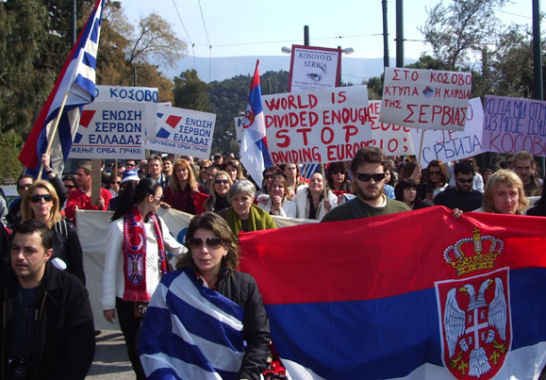
- Chicago, USA
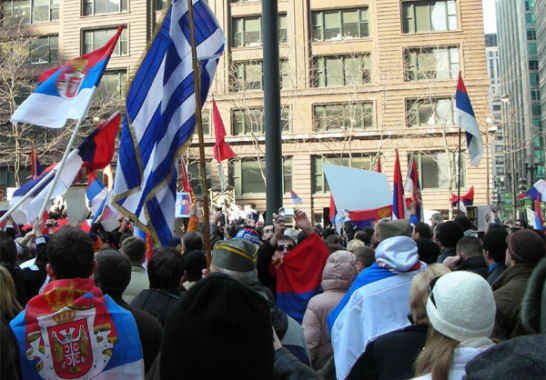
- Banja Luka, Republic of Srpska; The sign reads: This is Serbia
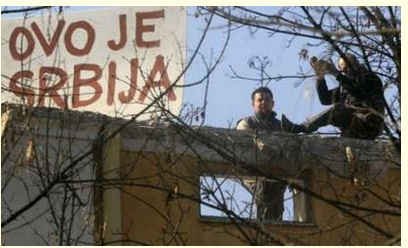
- Podgorica, Montenegro
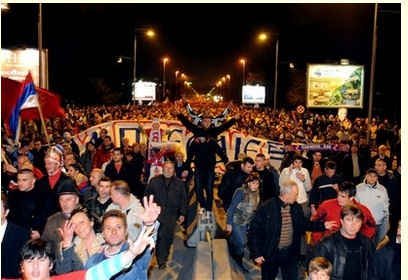
- Melbourne, Australia
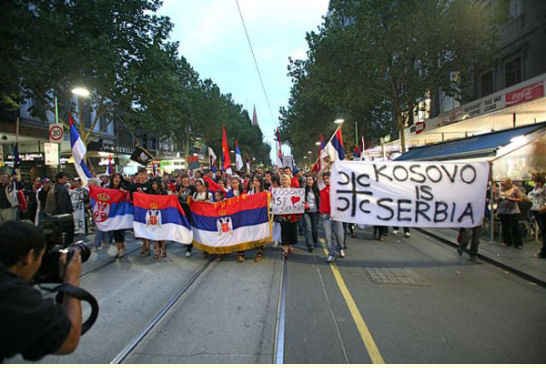
- Toronto, Canada
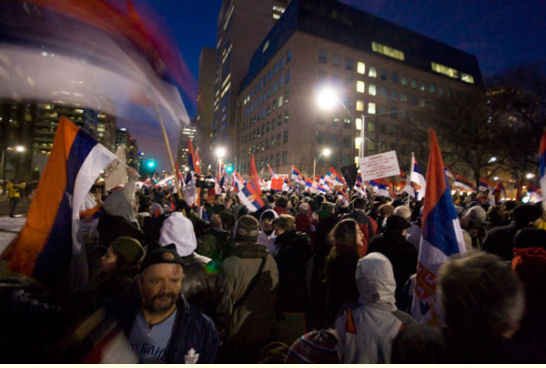
- London, UK
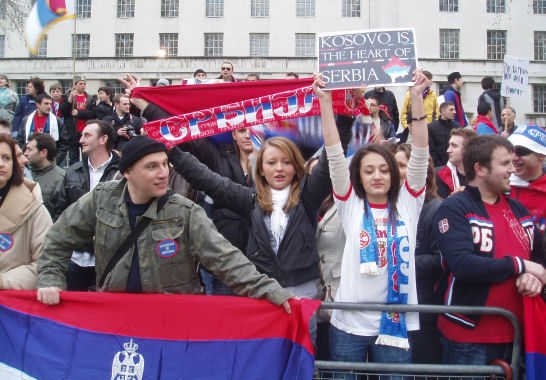
- Student protests, Kosovska Mitrovica, Serbia
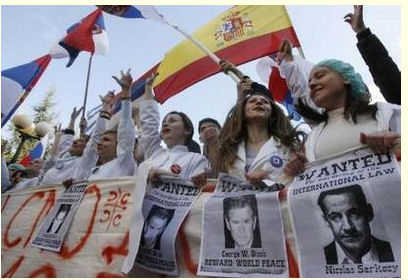
- Student protests, Kosovska Mitrovica, Serbia
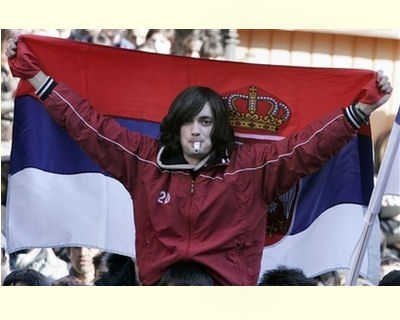
- Zürich, Switzerland
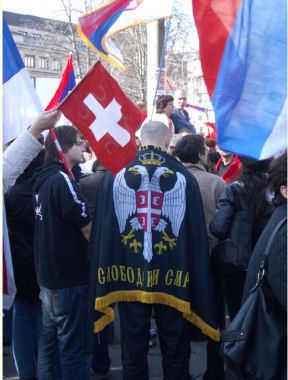
- Athens, Greece
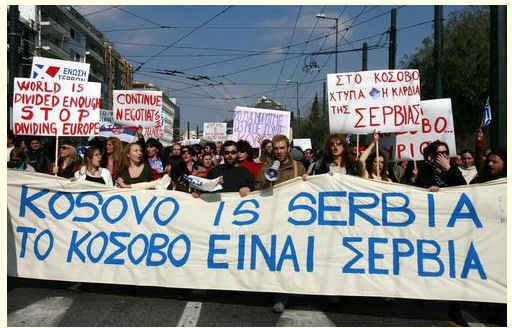
- Athens, Greece
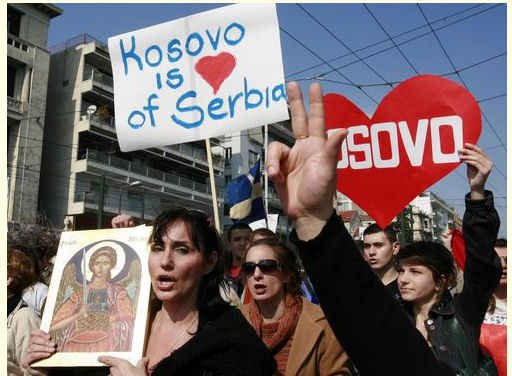
- Brussels, Belgium
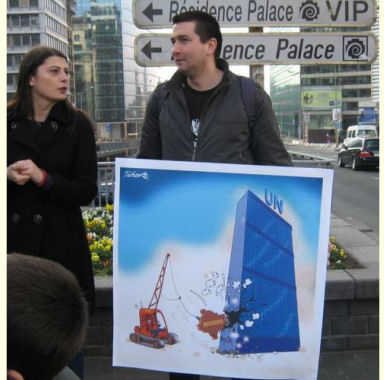
- Brussels, Belgium
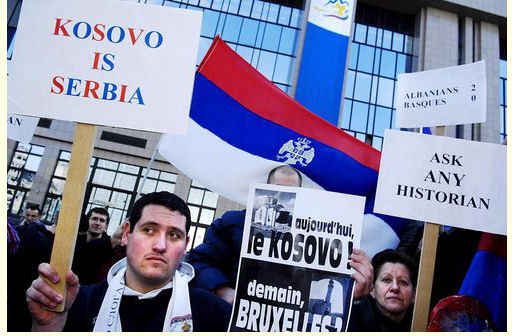
- Chicago, USA
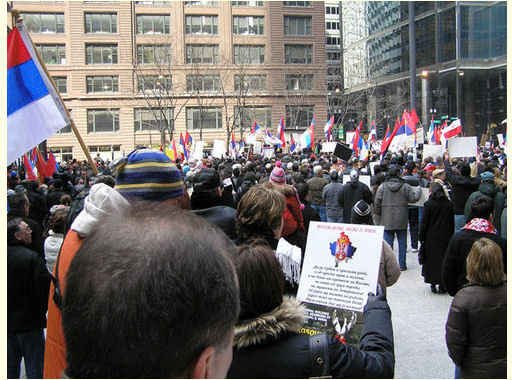
- Chicago, USA
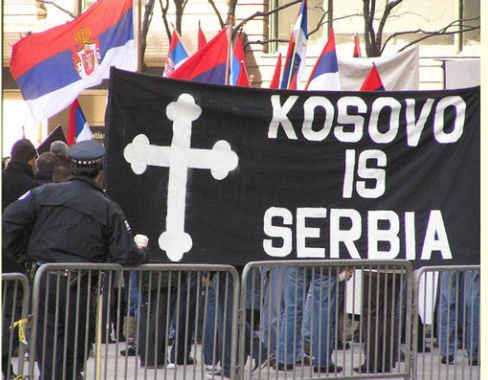
- Geneva, Switzerland
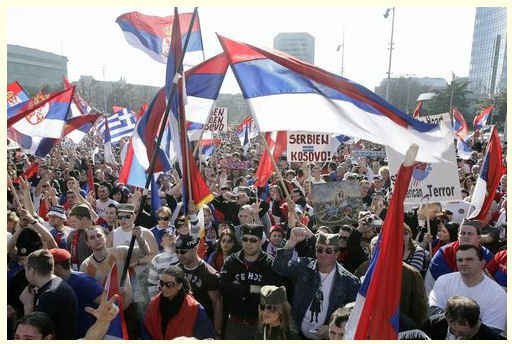
- Geneva, Switzerland
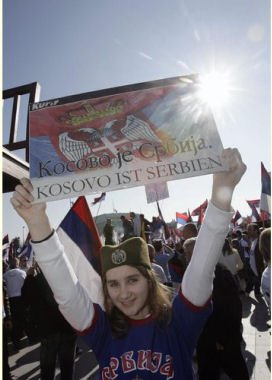
- London, UK
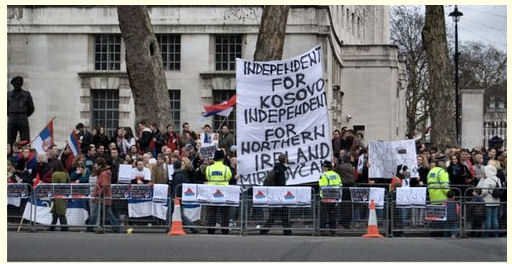
- Podgorica, Montenegro – Highschool students have been protesting for days
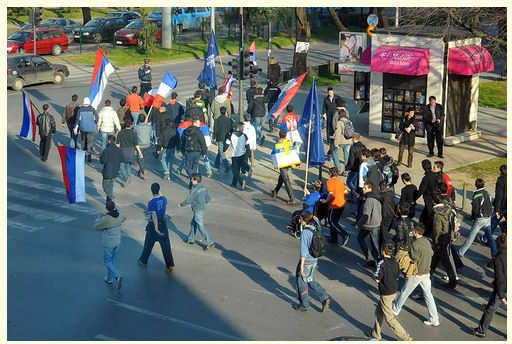
- Sarajevo, Bosnia-Herzegovina
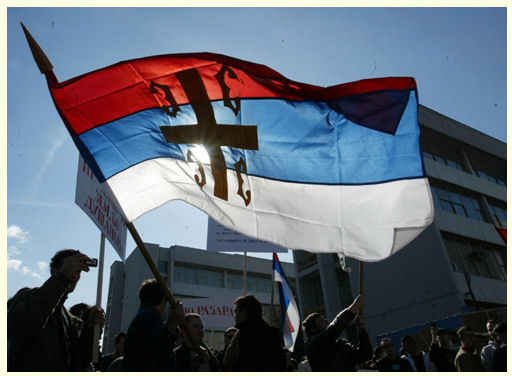
- Sarajevo, Bosnia-Herzegovina
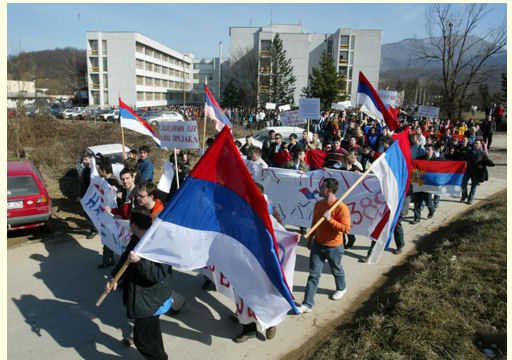
- Stuttgart, Germany
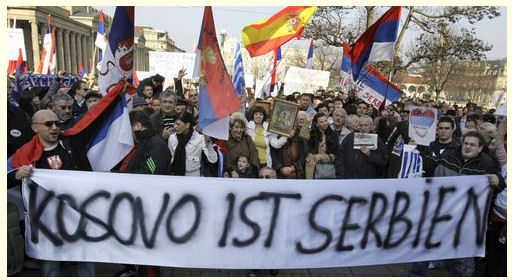
- Stuttgart, Germany
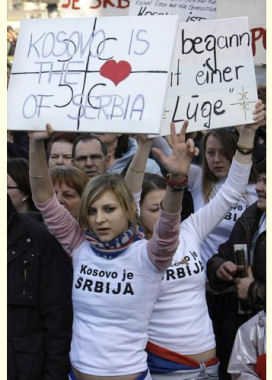
- Toronto, Canada
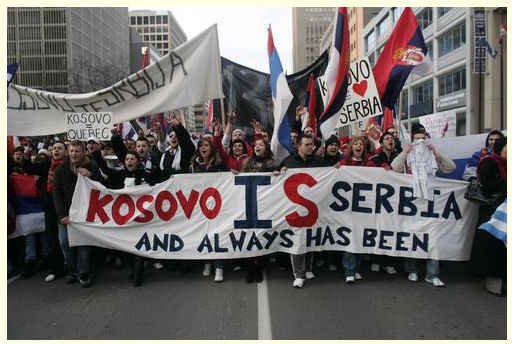
- Vancouver, Canada
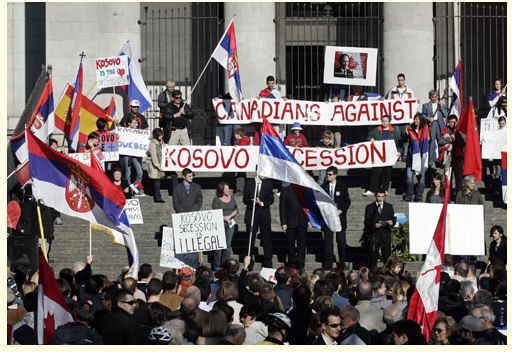
- Vancouver, Canada
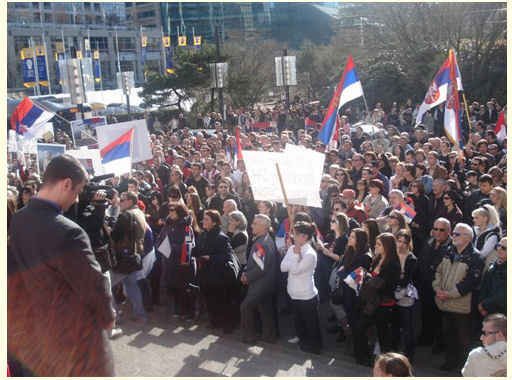
- Vancouver, Canada
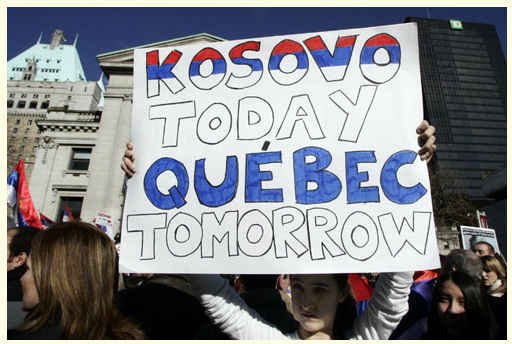
- Vienna, Austria
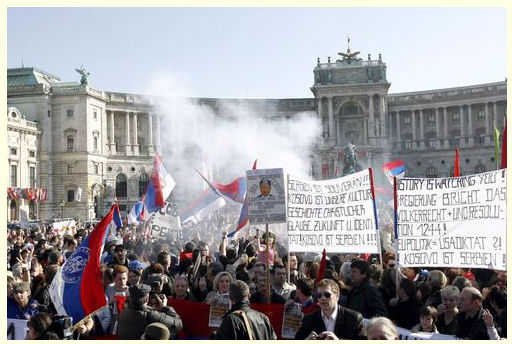
- Vienna, Austria
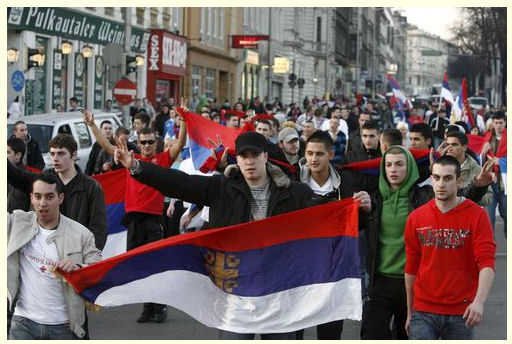
- Vienna, Austria
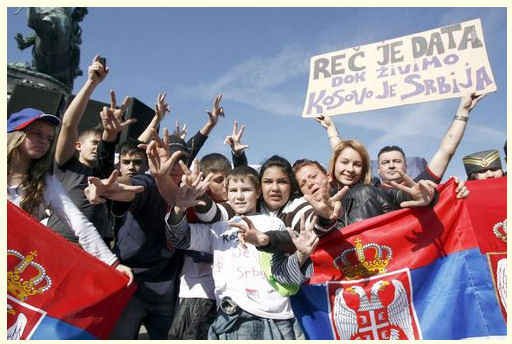
- Zürich, Switzerland
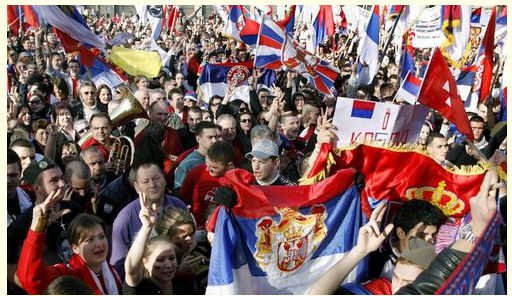
- Munich, Germany. The sign reads: Will the Turks soon get a part of Germany? Kosovo is Serbia – for 600 years already.
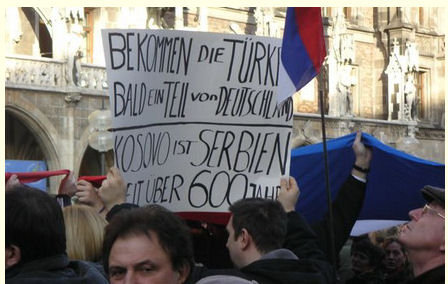
- Frankfurt am Main, Germany. The sign reads: Today it’s Kosovo? Will it be Berlin-Kreuzberg tomorrow?
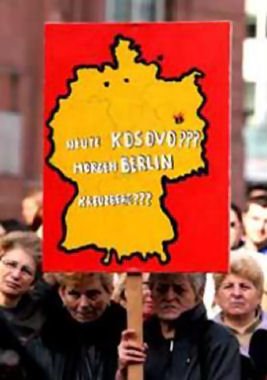
- Düsseldorf, Germany. The sign is a message to “Dear Mrs Merkel”: If Kosovo belongs to the Albanians, then Kreuzberg and Neu-Koelln (both districts of Berlin) belong to the Turks.
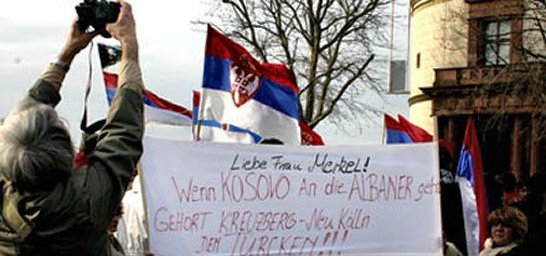
- Washington DC, USA

- Belgrade, Serbia
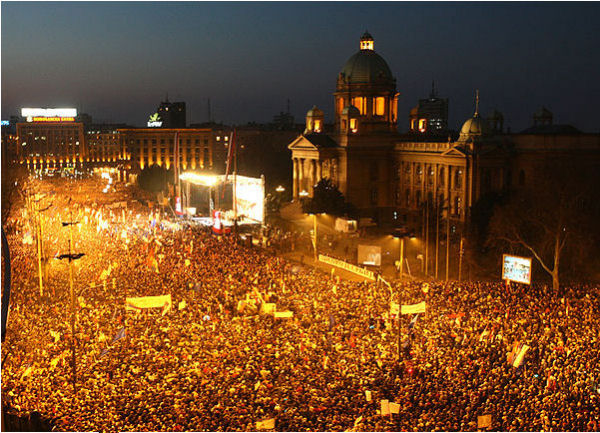
-
Recent
-
Links
-
Archives
- August 2008 (2)
- March 2008 (6)
- February 2008 (1)
-
Categories
-
RSS
Entries RSS
Comments RSS